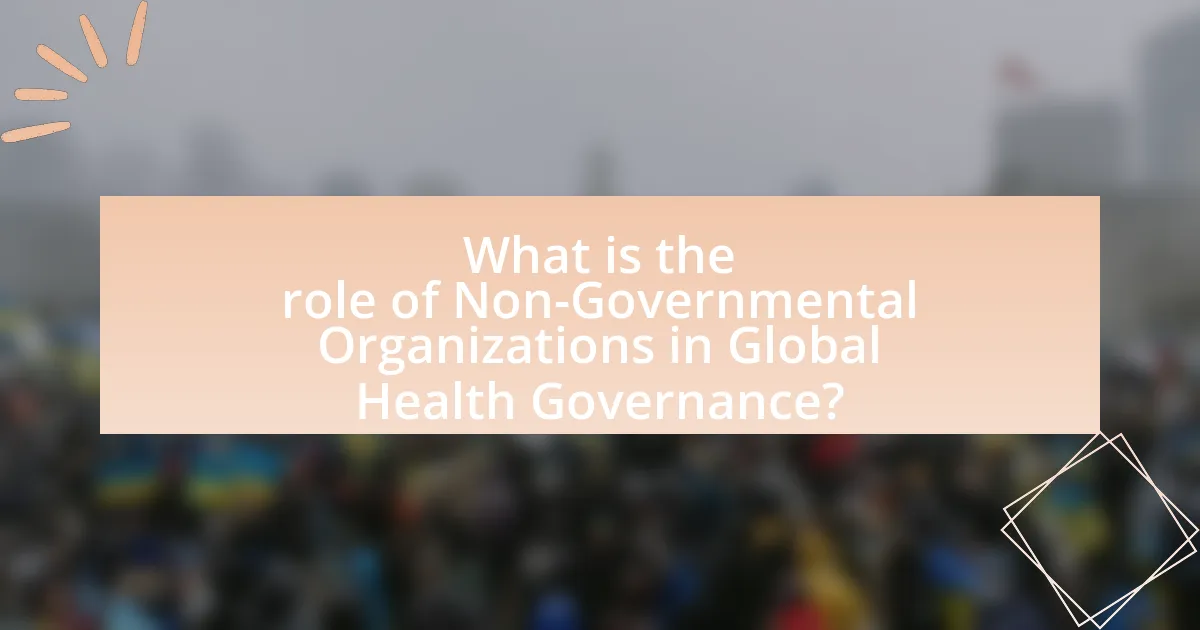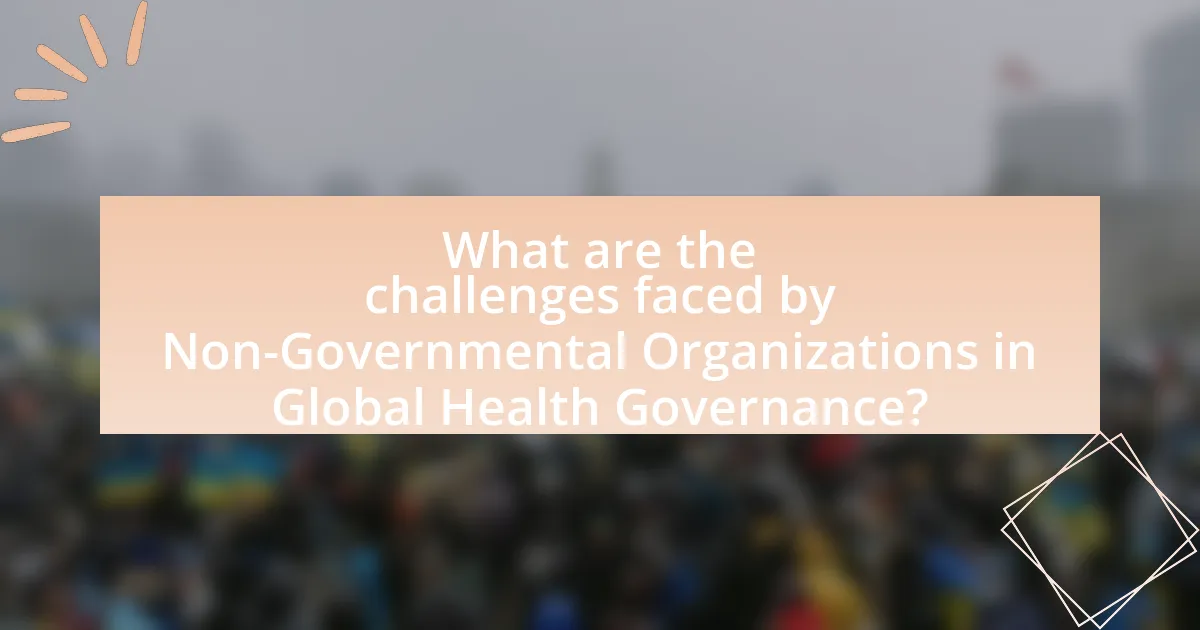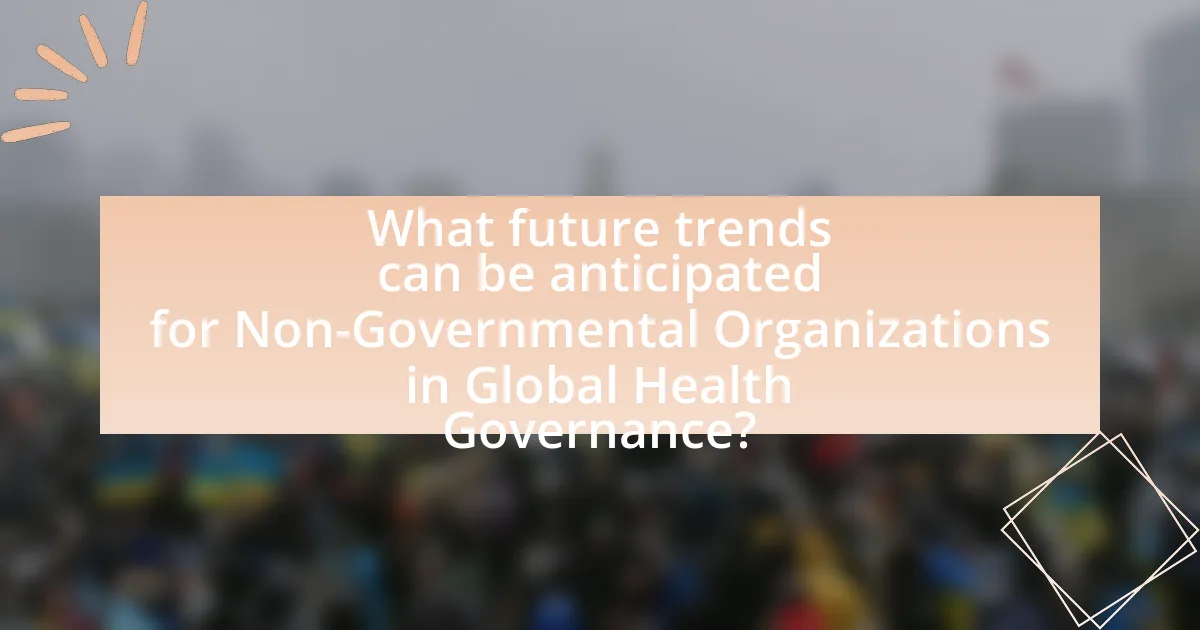Non-Governmental Organizations (NGOs) play a vital role in Global Health Governance by advocating for health equity, influencing policy decisions, and providing essential health services. They act as intermediaries between marginalized communities and governments, ensuring that health issues are addressed effectively. The article explores how NGOs influence health policy through advocacy, research, and collaboration, while also examining the challenges they face, such as funding limitations and regulatory barriers. Additionally, it highlights the importance of technology and data in enhancing NGO effectiveness and the strategies they can adopt to improve community engagement and partnerships with other stakeholders.

What is the role of Non-Governmental Organizations in Global Health Governance?
Non-Governmental Organizations (NGOs) play a crucial role in Global Health Governance by advocating for health equity, influencing policy decisions, and providing essential services. NGOs often serve as intermediaries between communities and governments, ensuring that marginalized populations have a voice in health-related matters. For instance, organizations like Médecins Sans Frontières (Doctors Without Borders) deliver medical care in crisis situations, while others, such as the Global Fund, mobilize resources to combat diseases like HIV/AIDS and malaria. Their involvement is supported by evidence showing that countries with active NGO participation in health governance tend to have better health outcomes, as NGOs contribute to data collection, capacity building, and the implementation of health programs.
How do Non-Governmental Organizations influence health policy decisions?
Non-Governmental Organizations (NGOs) influence health policy decisions primarily through advocacy, research, and collaboration with governments and international bodies. NGOs advocate for specific health issues, mobilizing public opinion and lobbying policymakers to prioritize these issues in health agendas. For instance, organizations like Médecins Sans Frontières have successfully influenced global health policies by highlighting the need for access to essential medicines and healthcare in crisis situations. Additionally, NGOs conduct research that provides evidence-based data, which can shape policy decisions; for example, the World Health Organization often relies on data from NGOs to inform its guidelines and recommendations. Furthermore, NGOs collaborate with governments and other stakeholders to implement health programs, thereby directly impacting policy through practical applications and demonstrating effective models for health interventions.
What mechanisms do NGOs use to advocate for health issues?
NGOs advocate for health issues through various mechanisms, including lobbying, public awareness campaigns, partnerships, and research initiatives. Lobbying involves engaging with policymakers to influence health-related legislation and funding, as seen in organizations like Médecins Sans Frontières, which advocates for access to essential medicines. Public awareness campaigns raise community consciousness about health issues, exemplified by the World Wildlife Fund’s efforts to address the health impacts of climate change. Partnerships with governments and other organizations enhance resource mobilization and program implementation, as demonstrated by the Global Fund to Fight AIDS, Tuberculosis and Malaria, which collaborates with multiple stakeholders to combat these diseases. Additionally, NGOs conduct research to provide evidence-based recommendations, contributing to informed decision-making in health governance.
How do NGOs collaborate with governments and international organizations?
NGOs collaborate with governments and international organizations through partnerships, advocacy, and resource sharing. These collaborations often involve NGOs providing expertise, data, and on-the-ground support to enhance policy development and implementation in global health initiatives. For instance, the World Health Organization frequently partners with NGOs like Médecins Sans Frontières to address health crises, leveraging their field experience to inform response strategies. Additionally, NGOs often engage in joint funding initiatives with governments and international bodies, facilitating the allocation of resources for health programs, as seen in the Global Fund to Fight AIDS, Tuberculosis and Malaria, which relies on NGO involvement for effective program delivery.
Why are Non-Governmental Organizations important in addressing global health challenges?
Non-Governmental Organizations (NGOs) are crucial in addressing global health challenges because they provide essential services, advocate for policy changes, and mobilize resources effectively. NGOs often operate in areas where government resources are limited, delivering healthcare services directly to underserved populations. For instance, organizations like Médecins Sans Frontières (Doctors Without Borders) have been instrumental in responding to health crises, such as the Ebola outbreak, by providing medical care and support in affected regions. Furthermore, NGOs play a significant role in raising awareness and influencing health policies at both local and international levels, as evidenced by their involvement in the Global Fund to Fight AIDS, Tuberculosis, and Malaria, which has mobilized billions in funding for health initiatives. Their ability to adapt quickly to emerging health threats and engage communities makes NGOs indispensable in the global health landscape.
What specific health issues do NGOs focus on?
Non-Governmental Organizations (NGOs) focus on specific health issues such as infectious diseases, maternal and child health, mental health, nutrition, and access to clean water and sanitation. For instance, organizations like Médecins Sans Frontières (Doctors Without Borders) prioritize infectious diseases such as HIV/AIDS and tuberculosis, while others like Save the Children emphasize maternal and child health initiatives. According to the World Health Organization, NGOs play a crucial role in addressing these health challenges by providing essential services, advocacy, and funding, thereby significantly impacting global health governance.
How do NGOs contribute to health education and awareness?
NGOs contribute to health education and awareness by implementing community-based programs that disseminate vital health information and promote healthy practices. These organizations often conduct workshops, seminars, and outreach initiatives that target specific health issues, such as maternal health, infectious diseases, and nutrition. For instance, the World Health Organization reports that NGOs have played a crucial role in increasing awareness about HIV/AIDS through educational campaigns, significantly reducing stigma and improving access to treatment in various regions. Additionally, NGOs often collaborate with local governments and health authorities to tailor their educational efforts to the unique needs of communities, ensuring that the information is relevant and actionable.

What are the challenges faced by Non-Governmental Organizations in Global Health Governance?
Non-Governmental Organizations (NGOs) face several challenges in Global Health Governance, including funding limitations, regulatory barriers, and coordination difficulties. Funding limitations hinder NGOs’ ability to implement and sustain health programs, as many rely on grants and donations that can be inconsistent. Regulatory barriers often complicate their operations, as differing national laws and policies can restrict their activities and access to resources. Coordination difficulties arise from the need to collaborate with various stakeholders, including governments and other organizations, which can lead to fragmented efforts and inefficiencies in addressing global health issues. These challenges collectively impact the effectiveness of NGOs in contributing to health governance on a global scale.
What barriers do NGOs encounter in their operations?
NGOs encounter several barriers in their operations, including funding constraints, regulatory challenges, and political opposition. Funding constraints limit their ability to implement programs effectively, as many NGOs rely on donations and grants that can be unpredictable. Regulatory challenges arise from complex legal frameworks that can hinder their activities, especially in countries with restrictive laws on foreign NGOs. Political opposition can manifest as hostility from governments that view NGOs as threats to their authority or as entities that challenge existing policies. These barriers significantly impact the capacity of NGOs to contribute to global health governance and address health issues effectively.
How does funding affect the effectiveness of NGOs?
Funding significantly affects the effectiveness of NGOs by determining their operational capacity and scope of activities. Adequate funding enables NGOs to hire skilled personnel, invest in necessary resources, and implement comprehensive programs, which directly enhances their ability to address health issues effectively. For instance, a study by the Global Fund to Fight AIDS, Tuberculosis and Malaria found that NGOs with stable funding were able to increase their outreach and improve health outcomes in communities by up to 30%. Conversely, insufficient funding can lead to limited program implementation, reduced staff capacity, and ultimately, a diminished impact on global health governance.
What role does political climate play in NGO activities?
The political climate significantly influences NGO activities by shaping their operational environment and funding opportunities. In authoritarian regimes, NGOs often face restrictions, limiting their ability to advocate for health policies or provide services, as seen in countries like Russia and China where government control stifles civil society. Conversely, in democratic settings, NGOs can thrive, engaging in advocacy and collaboration with governments, as evidenced by the successful partnerships between health NGOs and governments in countries like Sweden and Canada, which enhance public health initiatives. Thus, the political climate directly affects the scope, effectiveness, and sustainability of NGO efforts in global health governance.
How do NGOs measure their impact on global health?
NGOs measure their impact on global health through a combination of quantitative and qualitative metrics. They often utilize health indicators such as morbidity and mortality rates, vaccination coverage, and access to healthcare services to assess changes in health outcomes. For instance, the World Health Organization reports that NGOs have contributed to a 40% reduction in child mortality rates in regions where they operate, demonstrating their effectiveness in improving health conditions. Additionally, NGOs conduct surveys and gather feedback from communities to evaluate the effectiveness of their programs, ensuring that their interventions are aligned with local needs and priorities. This data-driven approach allows NGOs to adapt their strategies and demonstrate accountability to stakeholders.
What metrics are used to evaluate NGO effectiveness?
Metrics used to evaluate NGO effectiveness include program outcomes, financial health, stakeholder engagement, and impact assessments. Program outcomes measure the success of specific initiatives, often through quantitative data such as the number of beneficiaries served or health improvements achieved. Financial health is assessed through metrics like funding diversity, budget management, and cost-effectiveness ratios. Stakeholder engagement evaluates the level of community involvement and satisfaction, often through surveys and feedback mechanisms. Impact assessments analyze the long-term effects of NGO activities on target populations, utilizing methodologies such as randomized controlled trials or longitudinal studies to provide evidence of change. These metrics collectively offer a comprehensive view of an NGO’s performance and its contribution to global health governance.
How do NGOs report their outcomes to stakeholders?
NGOs report their outcomes to stakeholders through various methods, including annual reports, impact assessments, and stakeholder meetings. Annual reports provide a comprehensive overview of activities, financials, and outcomes, often including quantitative data and qualitative narratives to illustrate impact. Impact assessments evaluate specific projects or programs, measuring effectiveness against predefined indicators, which can be shared in reports or presentations. Stakeholder meetings facilitate direct communication, allowing NGOs to present findings, gather feedback, and engage in discussions about future initiatives. These reporting methods ensure transparency and accountability, essential for maintaining stakeholder trust and support in the context of global health governance.

What future trends can be anticipated for Non-Governmental Organizations in Global Health Governance?
Future trends for Non-Governmental Organizations (NGOs) in Global Health Governance include increased collaboration with governmental bodies, enhanced use of technology for data collection and dissemination, and a stronger focus on health equity and social determinants of health. NGOs are likely to partner more closely with international organizations and governments to address global health challenges, as seen in initiatives like the Global Fund to Fight AIDS, Tuberculosis and Malaria, which relies on NGO involvement for effective implementation. Additionally, the rise of digital health tools, such as telemedicine and mobile health applications, will enable NGOs to reach underserved populations more efficiently, as evidenced by the success of programs like mHealth in various countries. Finally, the emphasis on health equity will drive NGOs to advocate for policies that address systemic inequalities, reflecting the growing recognition of social determinants in health outcomes, supported by research from the World Health Organization highlighting the impact of these factors on public health.
How is technology shaping the work of NGOs in health governance?
Technology is significantly shaping the work of NGOs in health governance by enhancing data collection, improving communication, and facilitating remote healthcare delivery. For instance, NGOs utilize mobile health applications to gather real-time health data, which allows for timely interventions and better resource allocation. A study by the World Health Organization in 2021 highlighted that NGOs employing digital tools reported a 30% increase in the efficiency of health service delivery. Furthermore, technology enables NGOs to engage with communities through social media platforms, fostering awareness and education about health issues. This integration of technology not only streamlines operations but also amplifies the reach and impact of health governance initiatives led by NGOs.
What innovations are NGOs adopting to enhance their impact?
NGOs are adopting digital technology, data analytics, and community engagement strategies to enhance their impact. For instance, many NGOs utilize mobile health applications to improve access to healthcare information and services, which has been shown to increase patient engagement and adherence to treatment plans. Additionally, data analytics allows NGOs to assess program effectiveness and optimize resource allocation, leading to more targeted interventions. A report by the World Health Organization highlights that NGOs leveraging technology can reach underserved populations more effectively, thereby improving health outcomes and governance.
How can NGOs leverage data for better health outcomes?
NGOs can leverage data for better health outcomes by utilizing data analytics to identify health trends, target interventions, and measure the effectiveness of programs. For instance, organizations like Médecins Sans Frontières use health data to track disease outbreaks and allocate resources efficiently, resulting in timely responses that save lives. Additionally, data-driven approaches enable NGOs to advocate for policy changes by presenting evidence of health disparities, as seen in the work of the Global Fund to Fight AIDS, Tuberculosis and Malaria, which uses data to highlight the impact of funding on health outcomes. This strategic use of data not only enhances program effectiveness but also fosters accountability and transparency in health governance.
What best practices can NGOs adopt to improve their effectiveness in global health governance?
NGOs can improve their effectiveness in global health governance by adopting a multi-stakeholder approach that fosters collaboration with governments, international organizations, and local communities. This practice enhances resource sharing and knowledge exchange, which is crucial for addressing complex health challenges. For instance, the Global Fund to Fight AIDS, Tuberculosis and Malaria has demonstrated that partnerships between NGOs and governments can lead to increased funding and improved health outcomes, as evidenced by a 30% reduction in AIDS-related deaths in countries receiving support. Additionally, NGOs should focus on evidence-based interventions, utilizing data to inform their strategies and measure impact, which has been shown to increase program effectiveness and accountability. By implementing these best practices, NGOs can significantly enhance their role in global health governance.
How can NGOs strengthen partnerships with other stakeholders?
NGOs can strengthen partnerships with other stakeholders by actively engaging in collaborative initiatives that align their goals with those of governments, private sectors, and community organizations. This engagement can include joint projects, shared resources, and co-hosted events that foster mutual understanding and trust. For instance, the World Health Organization has highlighted successful partnerships where NGOs collaborated with local governments to implement health programs, resulting in improved health outcomes and resource efficiency. By establishing clear communication channels and demonstrating accountability, NGOs can build credibility and enhance their influence in global health governance.
What strategies can NGOs implement to enhance community engagement?
NGOs can enhance community engagement by implementing participatory approaches that involve local stakeholders in decision-making processes. This strategy fosters a sense of ownership and accountability among community members, leading to more effective and sustainable health interventions. For instance, a study by the World Health Organization highlights that community-led initiatives in health programs significantly improve participation rates and health outcomes, as seen in the successful implementation of community health worker programs in various countries. By actively involving the community, NGOs can tailor their programs to meet specific local needs, thereby increasing trust and collaboration.